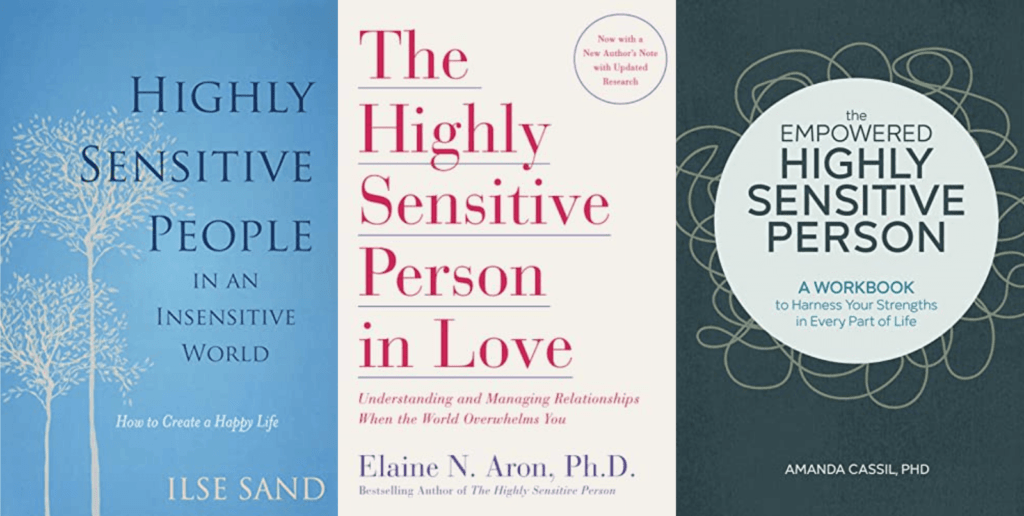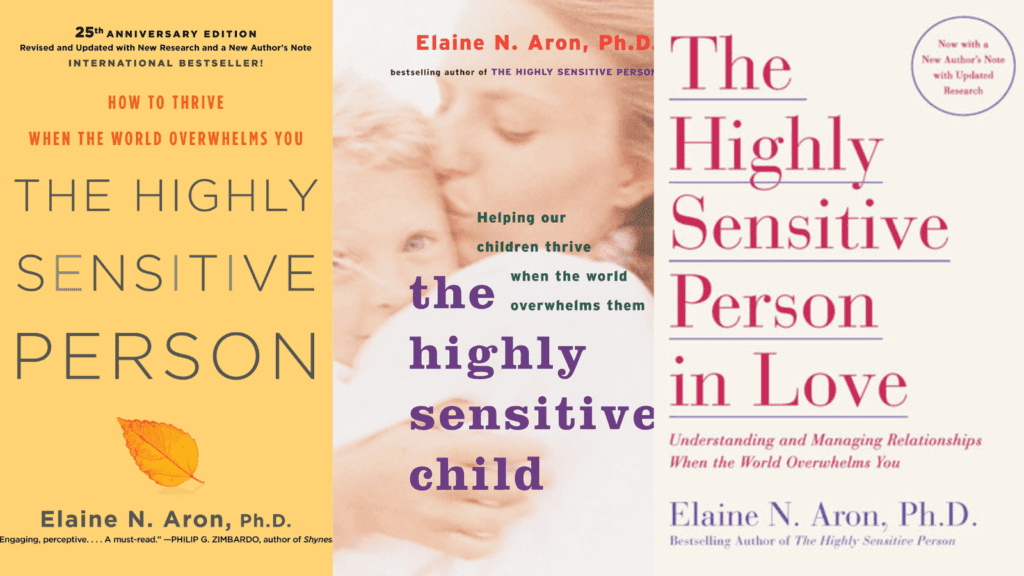The following are some of the best highly sensitive people books.
- What Is A Highly Sensitive Person?
- Characteristics of Highly Sensitive People
- Highly Sensitive People Books
- 1. The Highly Sensitive Person
- 2. The Highly Sensitive Person’s Guide to Dealing with Toxic People
- 3. Highly Sensitive People in an Insensitive World
- 4. The Empowered Highly Sensitive Person
- 5. The Highly Sensitive Person in Love
- 6. DBT Skills for Highly Sensitive People
- 7. Sensitive
- 8. Sensitive and Strong
- 9. The Highly Sensitive Person’s Companion
- 10. The Self-Care Plan for the Highly Sensitive Person
- How Highly Sensitive People Books Can Help
Disclosure: Some of the links below are affiliate links. This means that, at zero cost to you, I will earn an affiliate commission if you click through the link and finalize a purchase.
What Is A Highly Sensitive Person?
A highly sensitive person (HSP) is an individual who possesses a personality trait characterized by a heightened sensitivity to various external and internal stimuli.
This term was coined by psychologist Dr. Elaine Aron, who extensively researched and outlined the traits and experiences associated with being highly sensitive.
Related: Best 10 Emotional Intelligence Books
Characteristics of Highly Sensitive People
Here are some key characteristics commonly observed in highly sensitive people:
1. Heightened sensory processing: HSPs tend to be more sensitive to sensory stimuli such as sounds, lights, textures, and smells. They may be easily overwhelmed by loud noises, bright lights, or crowded environments.
2. Emotional responsiveness: Highly sensitive individuals often experience emotions more intensely. They may have heightened emotional responses to both positive and negative experiences, displaying greater empathy and insight into the feelings of others.
3. Deep processing: HSPs have a tendency to process information more deeply and thoroughly, often reflecting on their thoughts and experiences more extensively. This can contribute to increased creativity, introspection, and problem-solving abilities.
4. Overstimulation sensitivity: Due to their heightened sensitivity, HSPs may become overstimulated by high-pressure or chaotic environments. They may require regular periods of solitude and downtime to recharge and restore their energy levels.
5. Empathy and intuition: HSPs often possess a strong sense of empathy and an ability to intuitively understand and connect with others’ emotions. They may excel at picking up on subtle cues and nonverbal communication.
It’s important to note that being a highly sensitive person is not considered a disorder or a pathology but rather a normal variation of human temperament.
Understanding and embracing this trait can help HSPs develop self-care strategies, establish healthy boundaries, and engage in activities that align with their unique sensitivities.
Related: Best 7 Books On How To Control Your Emotions
Highly Sensitive People Books
1. The Highly Sensitive Person
By Elaine N. Aron Ph.D.

Drawing on her extensive research and clinical expertise, Dr. Aron helps readers understand the trait of high sensitivity, its common characteristics, and how it differs from other personality types. She offers practical advice on managing overstimulation, setting boundaries, and developing coping mechanisms to navigate various aspects of life effectively.
This book also sheds light on the potential benefits of being a highly sensitive person and how sensitivity can be harnessed as a strength in personal relationships, career choices, and self-care practices. Dr. Aron provides guidance on effective communication, managing stress and anxiety, and cultivating resilience as an HSP.
Related: Top 9 Highly Sensitive Person Coping Strategies [HSP’s Survival Guide]
2. The Highly Sensitive Person’s Guide to Dealing with Toxic People
By Shahida Arabi MA

This guide also emphasizes the importance of self-care and healing for highly sensitive individuals who have experienced the detrimental effects of toxic dynamics. Arabi offers practical advice on rebuilding self-esteem, nurturing supportive connections, and practicing self-compassion.
Through a combination of research, therapeutic insights, and real-life examples, “The Highly Sensitive Person’s Guide to Dealing with Toxic People” provides a roadmap for HSPs to free themselves from toxic influence, cultivate resilience, and embrace their sensitivity as a strength. It is an essential resource for those seeking to regain control of their lives and establish healthy, fulfilling relationships.
Related: Top Resources For Highly Sensitive Person (Tests, Support Groups, Books, Workbooks, Blogs, etc.)
3. Highly Sensitive People in an Insensitive World
By Ilse Sand

Sand offers strategies for managing overstimulation, setting boundaries, and practicing self-care in order to thrive in a world that can sometimes feel insensitive or overwhelming. She provides insight into the potential benefits of being highly sensitive, such as heightened creativity and intuition, and guides readers towards harnessing these gifts to their advantage.
Furthermore, the book addresses misconceptions and societal expectations surrounding sensitivity, challenging the notion that sensitivity is a weakness. Sand advocates for a more compassionate and inclusive society that acknowledges and respects the needs of highly sensitive individuals.
Related: Best 30 Journal Prompts For Highly Sensitive Person
4. The Empowered Highly Sensitive Person
By Amanda Cassil

Cassil’s workbook guides readers through various aspects of their lives, including relationships, work, self-care, and emotional well-being. Through insightful exercises, reflection prompts, and practical strategies, she assists HSIs in understanding and managing their sensitivity more effectively, leading to greater fulfillment and success.
This book goes beyond mere self-help advice and delves into key topics such as setting boundaries, practicing self-compassion, managing energy levels, and cultivating resilience. Cassil encourages readers to embrace their sensitivity as an asset rather than a liability, helping them recognize the unique gifts they bring to the table and empowering them to navigate the world with confidence.
Related: Top 8 Common Triggers For Empaths
5. The Highly Sensitive Person in Love
By Elaine N. Aron Ph.D.

Through relatable anecdotes, case studies, and evidence-based guidance, “The Highly Sensitive Person in Love” provides HSIs with validation and reassurance, helping them feel understood and accepted. Dr. Aron emphasizes the importance of self-awareness, self-acceptance, and effective communication in creating fulfilling and harmonious relationships as an HSI.
This book also addresses common challenges that arise when HSIs are in relationships with non-highly sensitive individuals, offering guidance on bridging the understanding gap and fostering greater empathy and compassion between partners.
Related: Top 10 Books About Empaths
6. DBT Skills for Highly Sensitive People
By Emma Lauer LCSW

Through relatable examples, case studies, and exercises, Lauer guides readers in understanding their unique emotional experience and learning how to embrace sensitivity as a strength. The book addresses common struggles faced by HSIs, such as emotional reactivity, boundary setting, building resilience, and managing relationships, providing practical strategies to overcome these challenges.
The techniques and skills outlined in “DBT Skills for Highly Sensitive People” are supported by scientific research and rooted in evidence-based practices. The book aims to empower HSIs, helping them build emotional resilience, enhance self-compassion, and develop healthier ways of navigating the world around them.
Related: Top 6 Challenges For Introverts (& How to Overcome Them)
7. Sensitive
By Jenn Granneman, Andre Sólo

By showcasing the strengths of HSPs, such as empathy, creativity, and deep thinking, the authors encourage readers to view sensitivity as a valuable asset rather than seeing it as a weakness or burden. Through relatable stories, research-backed information, and practical exercises, “Sensitive” guides HSPs on a journey of self-discovery and self-acceptance.
The book also sheds light on the misconceptions surrounding sensitivity and offers guidance on setting boundaries, practicing self-care, managing overstimulation, and finding fulfillment in a world that often overwhelms highly sensitive individuals.
Related: Best 99 Coping Skills (+FREE Coping Worksheets)
8. Sensitive and Strong
By Denise J. Hughes, Cheri Gregory

The book begins by explaining what it means to be a highly sensitive person, offering clarity and understanding around the unique qualities and challenges that HSIs may face. Through relatable anecdotes and relatable examples, the authors shed light on the physical, emotional, and social aspects of high sensitivity.
Additionally, the book offers practical tools and coping mechanisms to help HSIs manage and thrive in a world that may feel overwhelming. It addresses self-care practices, stress management techniques, and ways to enhance emotional resilience. With each chapter, readers gain valuable insights and actionable steps to support their personal growth and well-being.
Related: How To Feel Your Feelings? Top 9 Difficult Emotions To Cope With In Healthy Ways
9. The Highly Sensitive Person’s Companion
By Ted Zeff Ph.D.

The book includes a range of daily exercises designed to calm the senses and support emotional well-being. These exercises provide practical tools and techniques to help HSIs regulate their emotions, manage stress, and establish healthy boundaries. Dr. Zeff’s approach is grounded in scientific research and offers effective strategies for self-care and personal growth.
Through guidance on topics such as mindfulness, self-compassion, relaxation techniques, and creating a sanctuary in one’s home, Dr. Zeff empowers HSIs to create a lifestyle that honors their unique needs and fosters a sense of inner peace. The exercises are presented in a clear and accessible manner, making it easy for readers to incorporate them into their daily routines.
Related: Top 21 Emotional Writing Prompts To Process Emotions
10. The Self-Care Plan for the Highly Sensitive Person
By Amanda Cassil

Cassil’s strategies and exercises are rooted in scientific research and are designed to promote positive mental health, enhance self-awareness, and develop healthy coping mechanisms. Each day presents a new opportunity for HSIs to engage in self-reflection, practice self-compassion, and prioritize their well-being.
The book covers a wide range of topics, such as stress management, self-acceptance, self-expression, and building supportive relationships. Whether it’s journaling prompts, breathing exercises, or activities to engage the senses, readers will find a wealth of practical tools to incorporate into their daily lives.
Related: Top 19 Emotional Intelligence Activities (To Improve Low Emotional Intelligence)

How Highly Sensitive People Books Can Help
Highly sensitive people (HSPs) often benefit from reading books that address their unique experiences, provide insights, and offer practical strategies for navigating the world.
Here are a few ways in which highly sensitive people books can be helpful:
1. Self-awareness
Books written specifically for HSPs can help individuals gain a deeper understanding of themselves and their traits.
These books often discuss the characteristics of sensitivity, common challenges HSPs may face, and the potential strengths associated with being highly sensitive.
Increased self-awareness can lead to self-acceptance and a more positive outlook on one’s sensitivities.
2. Coping strategies
Many books on high sensitivity offer practical tips and techniques to help manage and cope with the challenges that come with being highly sensitive.
They may provide guidance on setting boundaries, managing overstimulation, practicing self-care, and enhancing resilience.
Learning effective coping strategies can empower HSPs to navigate their daily lives with greater ease and well-being.
Related: How To Start A Self Love Journey? Top 10 Powerful Ways to Love Yourself More
3. Relating to others
Books that explore highly sensitive people’s relationships, both personal and professional, can help individuals understand how their sensitivity can impact their interactions with others.
These books may provide insights into communication styles, conflict resolution, and fostering healthy connections.
Understanding how to navigate relationships as an HSP can lead to more fulfilling and harmonious connections with others.
4. Validation and support
Reading about the experiences of other highly sensitive people can offer a sense of validation and reassurance that one is not alone in their sensitivities.
Books written by psychologists, researchers, or other experts in the field can provide a scientific perspective, further validating the experiences and emotions of HSPs.
Feeling supported and understood can enhance overall well-being and reduce feelings of isolation.
Related: Top 5 Self Love Exercises (+FREE Self-Love Resources)


![Top 10 Qualities Of A Highly Sensitive Person [+Highly Sensitive Person's Survival Guide]](https://ineffableliving.com/wp-content/uploads/2022/02/self-love-3-1024x576.png)
